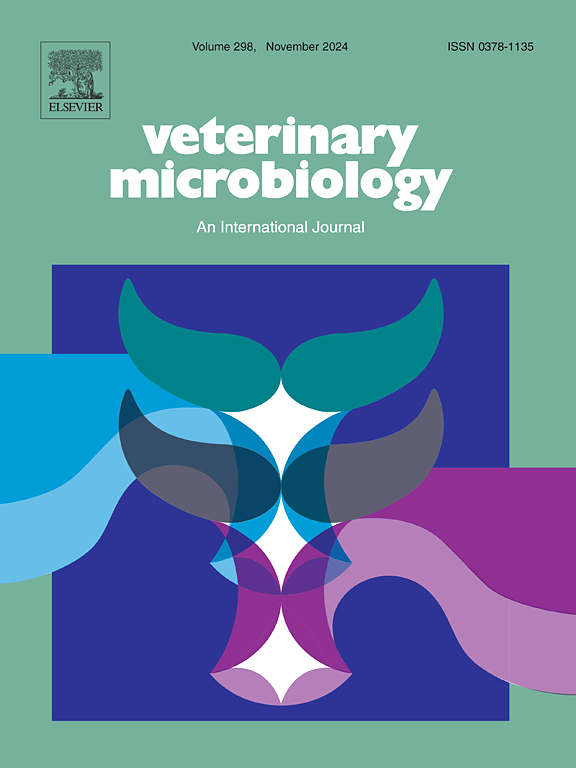作为减毒活疫苗的猪链球菌锰转运体突变体:安全性、有效性和毒力逆转机制
IF 2.4
2区 农林科学
Q3 MICROBIOLOGY
引用次数: 0
摘要
猪链球菌是仔猪死亡的主要原因,并对全球猪肉行业造成严重的经济损失。猪链球菌引起的严重侵袭性疾病包括败血症、脑膜炎、关节炎和心内膜炎。缺乏安全有效的疫苗阻碍了猪链球菌疾病的预防。在这项研究中,我们构建了一种猪链球菌减毒活疫苗候选疫苗,该疫苗缺乏主要的链球菌锰转运体,这是一种已知的猪链球菌毒力决定因素。在猪身上评价了该活疫苗的安全性和有效性。我们的临床研究结果表明,当接种1010 CFU剂量时,疫苗株是安全有效的。然而,较低剂量的109 CFU未能产生显著的免疫保护作用。为了研究佐剂是否可以在较低剂量下增强疫苗的效力,我们在疫苗中加入聚合佐剂并评估其性能。令人惊讶的是,4头接受佐剂疫苗的猪在接种阶段死亡。病理学、微生物学和遗传分析表明,疫苗株在这些动物中恢复了毒力。功能遗传分析发现,疫苗株获得了补偿性突变,上调了次级锰转运蛋白的表达,从而恢复了疫苗株的毒力。我们的研究结果为猪链球菌的宿主适应机制提供了新的认识,并为未来设计减毒活疫苗提供了有用的信息。本文章由计算机程序翻译,如有差异,请以英文原文为准。
Streptococcus suis manganese transporter mutant as a live attenuated vaccine: Safety, efficacy, and virulence reversion mechanisms
Streptococcus suis is the leading cause of mortality in piglets and is responsible for severe economic losses in the global pork industry. Severe invasive diseases caused by S. suis include sepsis, meningitis, arthritis, and endocarditis. S. suis disease prevention is hampered by the lack of safe and efficacious vaccines. In this study, we constructed an S. suis live attenuated vaccine candidate lacking the major streptococcal manganese transporter, a known virulence determinant of this organism. The safety and efficacy of this live vaccine were evaluated in swine. Our clinical study results showed that when administered at a dose of 1010 CFU, the vaccine strain was safe and efficacious. However, a lower dose of 109 CFU failed to generate significant immune protection. To investigate if an adjuvant could enhance the efficacy of the vaccine at a lower dose, we spiked the vaccine with a polymeric adjuvant and evaluated its performance. Surprisingly, four pigs receiving the adjuvanted vaccine died during the vaccination phase. Pathology, microbiology, and genetic analyses suggested that the vaccine strain reverted to virulence in these animals. Functional genetic analysis found that the vaccine strain acquired compensatory mutations that upregulated the expression of a secondary manganese transporter, which in turn restored the virulence of the vaccine strain. Our results provide a new understanding of S. suis host adaptation mechanisms and useful information for the design of future live-attenuated vaccines.
求助全文
通过发布文献求助,成功后即可免费获取论文全文。
去求助
来源期刊

Veterinary microbiology
农林科学-兽医学
CiteScore
5.90
自引率
6.10%
发文量
221
审稿时长
52 days
期刊介绍:
Veterinary Microbiology is concerned with microbial (bacterial, fungal, viral) diseases of domesticated vertebrate animals (livestock, companion animals, fur-bearing animals, game, poultry, fish) that supply food, other useful products or companionship. In addition, Microbial diseases of wild animals living in captivity, or as members of the feral fauna will also be considered if the infections are of interest because of their interrelation with humans (zoonoses) and/or domestic animals. Studies of antimicrobial resistance are also included, provided that the results represent a substantial advance in knowledge. Authors are strongly encouraged to read - prior to submission - the Editorials (''Scope or cope'' and ''Scope or cope II'') published previously in the journal. The Editors reserve the right to suggest submission to another journal for those papers which they feel would be more appropriate for consideration by that journal.
Original research papers of high quality and novelty on aspects of control, host response, molecular biology, pathogenesis, prevention, and treatment of microbial diseases of animals are published. Papers dealing primarily with immunology, epidemiology, molecular biology and antiviral or microbial agents will only be considered if they demonstrate a clear impact on a disease. Papers focusing solely on diagnostic techniques (such as another PCR protocol or ELISA) will not be published - focus should be on a microorganism and not on a particular technique. Papers only reporting microbial sequences, transcriptomics data, or proteomics data will not be considered unless the results represent a substantial advance in knowledge.
Drug trial papers will be considered if they have general application or significance. Papers on the identification of microorganisms will also be considered, but detailed taxonomic studies do not fall within the scope of the journal. Case reports will not be published, unless they have general application or contain novel aspects. Papers of geographically limited interest, which repeat what had been established elsewhere will not be considered. The readership of the journal is global.
 求助内容:
求助内容: 应助结果提醒方式:
应助结果提醒方式:


